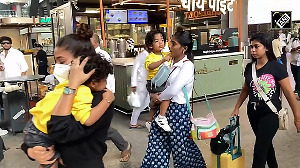The current instability in the world is a result of long term systemic and socio-politico problems, points out Colonel Anil A Athale (retd).

A common citizen is today baffled at the turn of events on the global scene.
The Ukraine war has been going on for the last two years. Israel's anti-Hamas campaign has been going on for over 6 months.
A rag tag bunch like the Houthi rebels in Yemen regularly target shipping in international waters.
Iran and Pakistan and Israel-Iran exchange missile salvos.
The world indeed seems like spinning out of control. In all this turmoil, the elephant in the room is the missing United Nations.
Many strategic analysts, more aptly current affairs specialists, have been writing about the arc of instability from Yemen to Ukraine.
Some have drawn attention to the fact that many important countries face general elections this year and that has created an unstable world.
This is a typical case of counting the trees while missing the forest.
The current instability in the world is a result of long term systemic and socio-politico problems.
Unfortunately, most think-tanks the world over start with the notion of wanting to 'solve' the problem even before understanding the problem.
Solution oriented rather than understanding oriented research is at the base of the world's inability to find a solution. One has to first know before one can act.

Fundamentally, the United Nations organisation, formed to deal with issues of the 20th century is hopelessly out of tune with world power realities in the 21st century.
While mankind has made tremendous technological progress, the world today is economically, politically and militarily, interdependent.
But the building blocks of the international State system -- nation States -- are a relic of 19th century Europe.
This mismatch between institutions and the altered world power balance and technology of integration versus narrow nationalism is at the heart of world instability and conflict.
Another factor for the instability is in the area of military technology.
Offensive weapons like drones and rockets have proliferated and are cheap while the defensive shield against them is both very costly and technologically more challenging.
The military balance has shifted decisively in favour of offensive weapons vis a vis defensive weaponw.
In addition to the above situation, 1992 saw the end of bipolar world balance with the virtual demise of the USSR.
In the period between 1945 and 1992, global conflicts were limited by the superpowers's agreement post the 1962 Cuban Missile Crisis to not let any regional conflict spin beyond a limit so as to avoid nuclear armageddon.
With the weakening of this central restraining power, in the multipolar world, all major powers are pursuing policies to safeguard their spheres of influence.
The Ukraine war is a result of NATO's attempt to expand into the Russian sphere of influence.
In the Middle East, Iran and Saudi Arabia are competing for expanding their zones of influence.
Both are aspirants for leadership of the Muslim world. Iranian support to the Palestinians is a part of the game.
Israel is fighting to retain its military deterrent in a hostile Middle East. Conflicts in Syria, Yemen and Lebanon are all part of this larger design.

In the earlier two power dominated world there were 'small wars' being fought from Korea,to Vietnam to the Middle East and even our own subcontinent.
But these were also proxy wars between the two superpowers and it is they who controlled the intensity and spread.
The overarching world power architecture of nuclear deterrence limited conflicts and injected a degree of restraint.
Post the 1992 demise of the Soviet Union and two power balance, multipolarity has emerged as the new reality.
While this has indeed given greater freedom to more countries to exercise their power, it has also destabiliwed the world order.
One other factor, seldom mentioned is the impact of th shifting demographic balance on internal and external policies of nations in the so-called first world.
US and French politics have taken a decisive rightward turn due to the fear of erstwhile minorities/immigrants taking over State power.
Brexit was a result of xenophobia in UK and the Western media is silent on obnoxious measures like deporting illegal migrants to Rwanda.
Many statesmen, notably President John F Kennedy in collaboration with economist John Kenneth Galbraith had strived for increasing world trade as an antidote to international conflicts.
The idea was that once world trade flourisheD, all countries would have an economic stake in world peace.
The World Trade Organisation evolved out of the GATT (General Agreement on Trade and Tariff) and Kennedy Round of 1962.
Unfortunately, world peace born out of economic interest was sabotaged due to the watered down WTO charter that left loopholes for nations to take measures to protect 'national security' and flout the philosophy of free trade.
The recent imposition of economic sanctions by individual countries or Western cartels has sounded the death knell on WTO, much like the UN.

Add to this the increased urbanisation world over. Violence in society is a part of urban pathology as proved by many socio-biologists.
Cramped living, fast paced life and the daily rat race, are the characteristics of urban living.
The burden of this short article is that the solution to current world instability and conflicts has to take account of all these multiple factors and not focus of counting trees.
Colonel Anil A Athale (retd) is a military historian whose earlier columns can be read here.
Feature Presentation: Aslam Hunani/Rediff.com











 © 2025
© 2025